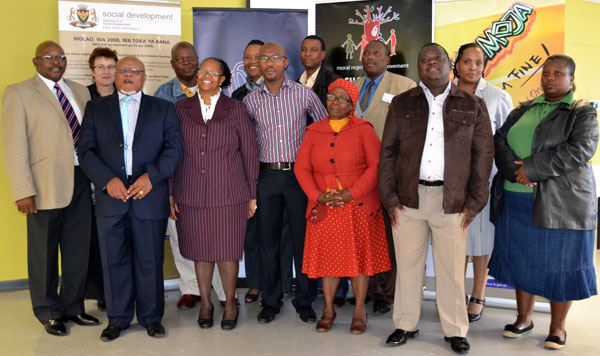 |
|
In front, from the left, in front: Joe Mosuhli (DSD Provincial Office), Ms Maboe Grey Magaiza (Lecturer: Sociology), Ms SM Khupane (Thibella Marakabeng Traditional Council), Mr Mbulaheni Mulaudzi (DSD). At the back, from the left: Dr Malete, Dr Elsa Crause (Departmental Head: Sociology), Chief Mahase (Phomolong Traditional Council), Mrs Sadi Luka (DSD), Chief QD Moloi (Makgolokweng Traditional Council), Chief Sekonyela (Thibella Traditional Council), Ms Mpontseng Kumeke (DSD) and Mrs Malikoankoetla Tsosane (Matsieng Traditional Council).
|
The National Department of Social Development (DSD) and the Free State Department of Social Development, in collaboration with the Qwaqwa Campus of the University of the Free State, hosted a road show on the professionalisation of Community Development Practice yesterday.
This inaugural road show was aimed at conceptualising and soliciting stakeholder buy-in in the new Community Development Qualification Framework, which was jointly developed by the department and the South African Qualifications Authority (SAQA). The road show also briefed stakeholders on the Recognition of Prior Learning (RPL) pilot project that will integrate the current community development workforce into the national qualification framework. Stakeholders were also briefed on the professionalisation process and were given a platform on which to talk about related issues. This included the formation of a community development association, a unified professional body and eventually, the formation of an independent statutory council.
In his welcoming remarks, Campus Principal Dr Elias Malete said that the envisaged programme of professionalising community development practice would address the local needs and bring vibrancy to affected communities. “The programme will definitely help in revitalizing our campus and the community we serve,” said Dr Malete. He was referring to the Qwaqwa Campus Revitalisation Plan. “Among the plans we have is the introduction of the four year Bachelor of Community Development degree. We are confident that our proposal will be received favourably and that we will offer this qualification from 2013,” Dr Malete said to applause from the invited guests and community members.
Talking on behalf of the provincial Department of Social Development was the department's head, Me Matlhogonolo Maboe, who emphasised the fact that large segments of communities were entirely dependent on the community development sector for their daily survival. “In professionalising the sector, we would be building vibrant rural communities and repositioning them to be better equipped in addressing what President Zuma referred to as the ‘triple challenge of unemployment, poverty and inequality’ in his State of the Nation address in February”, said Me Maboe.
Traditional leaders from the Qwaqwa area, national and provincial departmental officials as well as students and staff of the UFS attended the road show.